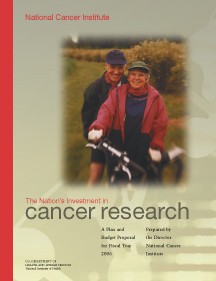Director's Update: December 7, 2004

 It is with great hope for the future that I have submitted to Congress The Nation's Investment in Cancer Research (available at http://plan.cancer.gov), NCI's plan and budget proposal for fiscal year 2006. This proposal reflects efforts to acquire and apply the resources and programs to achieve our challenge goal to the nation - to eliminate suffering and death due to cancer by 2015.
It is with great hope for the future that I have submitted to Congress The Nation's Investment in Cancer Research (available at http://plan.cancer.gov), NCI's plan and budget proposal for fiscal year 2006. This proposal reflects efforts to acquire and apply the resources and programs to achieve our challenge goal to the nation - to eliminate suffering and death due to cancer by 2015.
Anchored in seven strategic investment areas, this proposal describes next steps for delivering the promise of improved cancer care and public health for all. These strategic areas are: cancer prevention, early detection, and prediction; overcoming cancer health disparities; the strategic development of cancer interventions; an integrated cancer trials system; advanced technologies; integrative cancer biology; and molecular epidemiology.
Also featured in the document is the development of the National Advanced Technologies Initiative for cancer (NATIc), an above-and-beyond proposal aimed at harnessing the enormous medical potential of emerging technologies. NATIc will provide the research and development communities with the necessary infrastructure to speed the development of new diagnostic tests and cancer treatments by fostering, integrating, and applying the nation's vast biomedical technology resources and capabilities. Advanced health care technologies resulting from this initiative will provide unique resources to help NCI achieve its goals, but also will support research advances in other diseases and ultimately accelerate the emergence of personalized medicine.
While this budget proposal focuses on scientific and technological advances, it also outlines how progress in each area will improve patient care and public health. We envision evidence-based, patient-centered care that is delivered in a timely, technically competent fashion and is administered with sound communication, shared decision making, and cultural sensitivity.
To improve the quality of cancer care, the Nation's Investment proposes funding focusing on community-based interventions that address disparities in care; training programs to create a diverse and culturally sensitive research and care workforce; and collaborations to improve early detection, diagnosis, prognosis, treatment, and survivorship for people over 65.
To optimize health and quality of life after cancer, we propose including more quality-of-life end points in NCI-supported trials, as well as continued research and development to improve understanding of survivorship issues in underserved populations; reduce long-term side effects of cancer treatment; and identify genetic factors that affect prognosis, tumor progression, therapeutic outcomes, and side effects.
Finally, a cross-cutting element of the 2006 budget proposal is our effort to invigorate the use of team science and research teams of the future. Increasingly, we believe that scientists must be able to work as part of interdisciplinary teams that allow them to more fully characterize the interlocking environmental, lifestyle, genetic, and molecular variables that contribute to cancer.
Our nation's investment in the past has led us to unprecedented opportunities across a continuum of discovery, development, and delivery that will make it possible for millions of people to no longer fear cancer as a cause of suffering and death. Rapid progress in prevention, early detection, elimination, and control of this disease will make this goal a reality.
At NCI, we believe the 2015 goal is achievable and that we are on a trajectory for success. There are, of course, hurdles that must be overcome, but I believe that our 2006 plan and budget proposal affirms that we are on the right track and requests the necessary resources to remain on course.
Dr. Andrew C. von Eschenbach
Director, National Cancer Institute
|